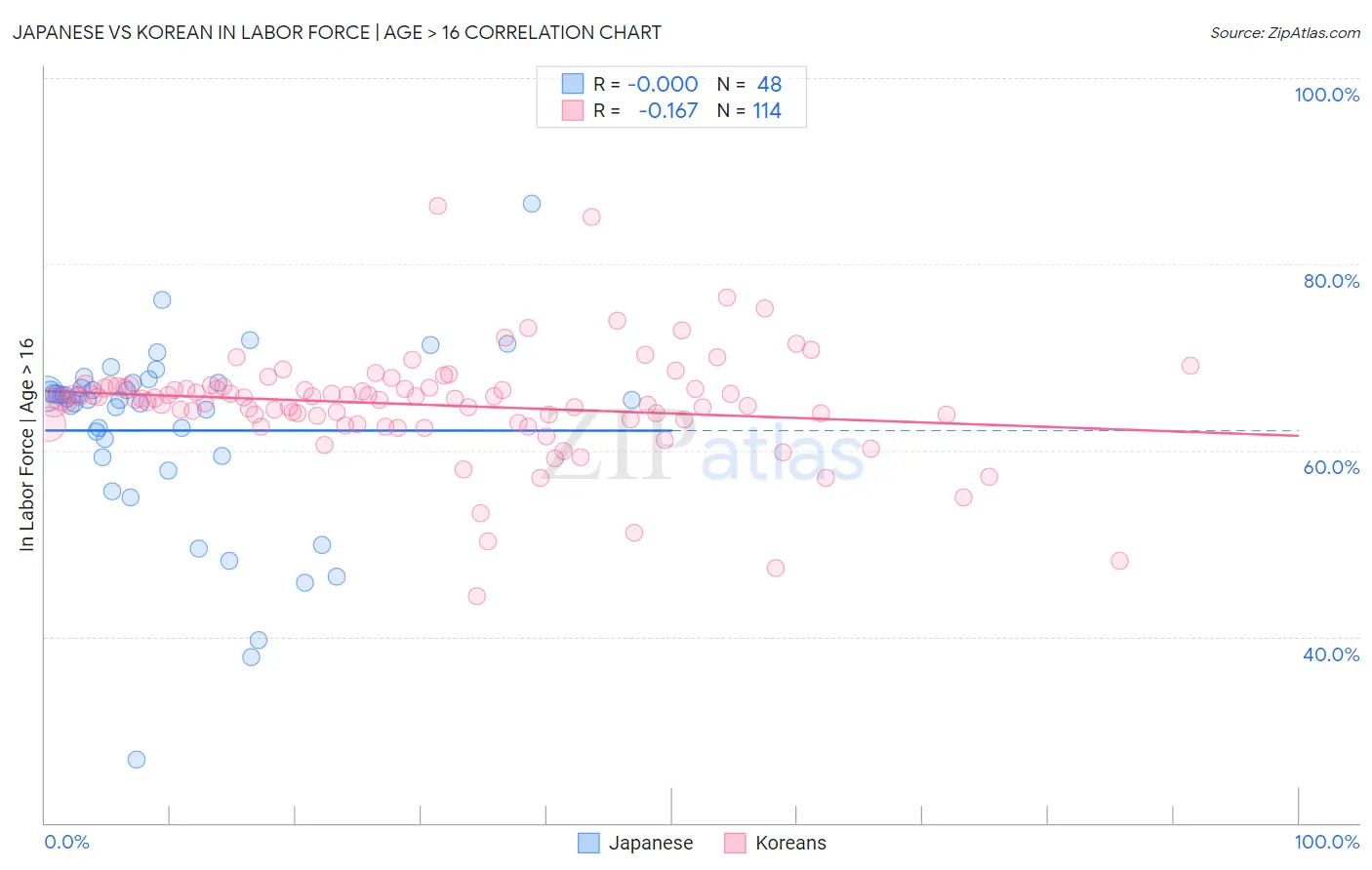Japanese vs Korean In Labor Force | Age > 16
COMPARE
Japanese
Korean
In Labor Force | Age > 16
In Labor Force | Age > 16 Comparison
Japanese
Koreans
65.8%
IN LABOR FORCE | AGE > 16
97.7/ 100
METRIC RATING
110th/ 347
METRIC RANK
65.7%
IN LABOR FORCE | AGE > 16
95.3/ 100
METRIC RATING
126th/ 347
METRIC RANK
Japanese vs Korean In Labor Force | Age > 16 Correlation Chart
The statistical analysis conducted on geographies consisting of 249,190,051 people shows no correlation between the proportion of Japanese and labor force participation rate among population ages 16 and over in the United States with a correlation coefficient (R) of -0.000 and weighted average of 65.8%. Similarly, the statistical analysis conducted on geographies consisting of 510,971,555 people shows a poor negative correlation between the proportion of Koreans and labor force participation rate among population ages 16 and over in the United States with a correlation coefficient (R) of -0.167 and weighted average of 65.7%, a difference of 0.21%.

In Labor Force | Age > 16 Correlation Summary
| Measurement | Japanese | Korean |
| Minimum | 26.8% | 44.3% |
| Maximum | 86.5% | 86.3% |
| Range | 59.7% | 42.0% |
| Mean | 62.1% | 64.9% |
| Median | 65.4% | 65.6% |
| Interquartile 25% (IQ1) | 59.4% | 63.3% |
| Interquartile 75% (IQ3) | 67.0% | 66.8% |
| Interquartile Range (IQR) | 7.6% | 3.5% |
| Standard Deviation (Sample) | 10.4% | 5.8% |
| Standard Deviation (Population) | 10.3% | 5.8% |
Demographics Similar to Japanese and Koreans by In Labor Force | Age > 16
In terms of in labor force | age > 16, the demographic groups most similar to Japanese are Immigrants from Honduras (65.8%, a difference of 0.020%), Immigrants from Spain (65.8%, a difference of 0.040%), Immigrants from Japan (65.8%, a difference of 0.040%), Laotian (65.8%, a difference of 0.040%), and Pakistani (65.8%, a difference of 0.070%). Similarly, the demographic groups most similar to Koreans are Norwegian (65.7%, a difference of 0.0%), Immigrants from Iraq (65.7%, a difference of 0.010%), Iraqi (65.7%, a difference of 0.010%), Immigrants from Eastern Asia (65.7%, a difference of 0.020%), and Ecuadorian (65.6%, a difference of 0.030%).
| Demographics | Rating | Rank | In Labor Force | Age > 16 |
| Immigrants | Spain | 98.0 /100 | #108 | Exceptional 65.8% |
| Immigrants | Japan | 98.0 /100 | #109 | Exceptional 65.8% |
| Japanese | 97.7 /100 | #110 | Exceptional 65.8% |
| Immigrants | Honduras | 97.5 /100 | #111 | Exceptional 65.8% |
| Laotians | 97.4 /100 | #112 | Exceptional 65.8% |
| Pakistanis | 97.1 /100 | #113 | Exceptional 65.8% |
| Hondurans | 97.1 /100 | #114 | Exceptional 65.8% |
| Immigrants | Indonesia | 96.8 /100 | #115 | Exceptional 65.7% |
| Argentineans | 96.7 /100 | #116 | Exceptional 65.7% |
| Immigrants | Iran | 96.6 /100 | #117 | Exceptional 65.7% |
| Immigrants | Thailand | 96.6 /100 | #118 | Exceptional 65.7% |
| Immigrants | France | 96.4 /100 | #119 | Exceptional 65.7% |
| Immigrants | Hong Kong | 96.2 /100 | #120 | Exceptional 65.7% |
| New Zealanders | 96.0 /100 | #121 | Exceptional 65.7% |
| Immigrants | Ecuador | 95.9 /100 | #122 | Exceptional 65.7% |
| Immigrants | Iraq | 95.5 /100 | #123 | Exceptional 65.7% |
| Iraqis | 95.4 /100 | #124 | Exceptional 65.7% |
| Norwegians | 95.3 /100 | #125 | Exceptional 65.7% |
| Koreans | 95.3 /100 | #126 | Exceptional 65.7% |
| Immigrants | Eastern Asia | 94.9 /100 | #127 | Exceptional 65.7% |
| Ecuadorians | 94.7 /100 | #128 | Exceptional 65.6% |